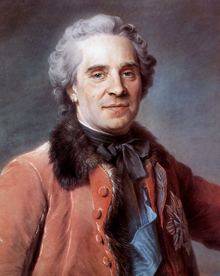Maurice, Count of Saxe
| Maurice de Saxe | |||||
|---|---|---|---|---|---|
| Count of Saxony Marshal General of France |
|||||

Maurice de Saxe wearing the Polish Order of the White Eagle, 1748
|
|||||
| Born |
28 October 1696 Goslar |
||||
| Died | 20 November 1750 (aged 54) Château de Chambord |
||||
| Burial | Saint Thomas Church, Strasbourg | ||||
| Spouse | Johanna Viktoria von Loeben | ||||
| Issue | August Adolf von Sachsen Marie-Aurore de Saxe |
||||
|
|||||
| Father | Augustus II of Poland | ||||
| Mother | Maria Aurora of Königsmarck | ||||
| Full name | |
|---|---|
| Hermann Maurice |
Maurice, Count of Saxony (German: Hermann Moritz Graf von Sachsen, French: Maurice de Saxe; 28 October 1696 – 20 November 1750) was a German soldier and officer of the Army of the Holy Roman Empire, the Imperial Army, and at last in French service who became a Marshal and later also Marshal General of France. He is best known for his decisive victory at the Battle of Fontenoy and is honored in the Walhalla memorial.
Maurice was born at Goslar, an illegitimate son of Augustus II the Strong, King of Poland and Elector of Saxony, and the Countess Maria Aurora of Königsmarck. He was the first of eight extramarital children whom August acknowledged, although as many as 354 are claimed by sources, including Wilhelmine of Bayreuth, to have existed.
In 1698, the Countess sent him to his father in Warsaw. August had been elected King of Poland in the previous year, but the unsettled condition of the country obliged Maurice to spend the greater part of his youth outside its borders. This separation from his father made him independent and had an important effect on his future career.
At the age of twelve, Maurice served in the Imperial Army under Prince Eugene of Savoy, at the sieges of Tournai and Mons and at the Battle of Malplaquet. A proposal at the end of the campaign to send him to a Jesuit college in Brussels was dropped due to the protests of his mother.
...
Wikipedia
